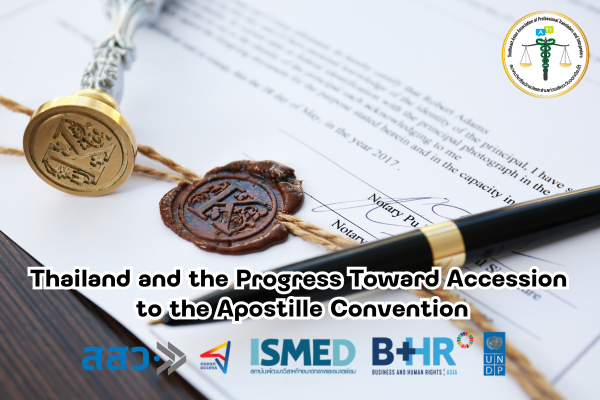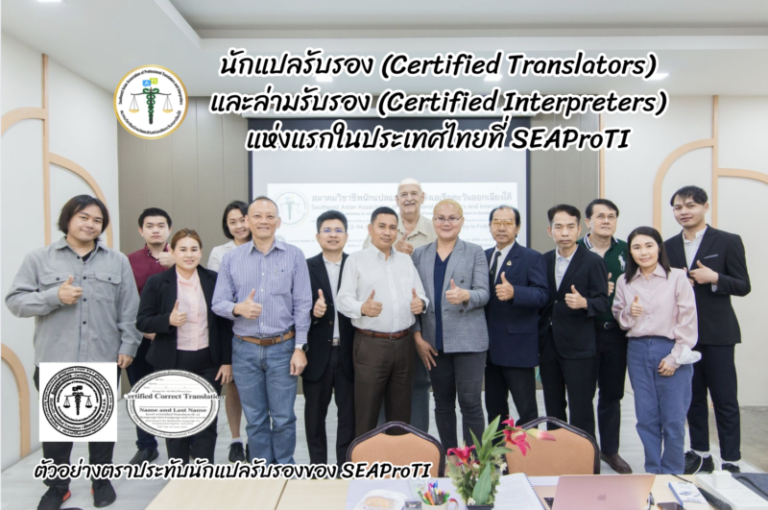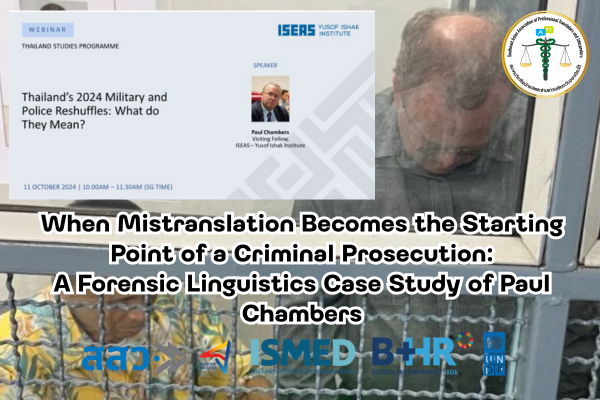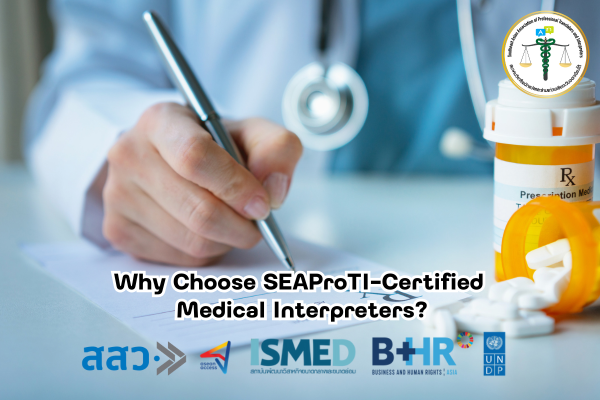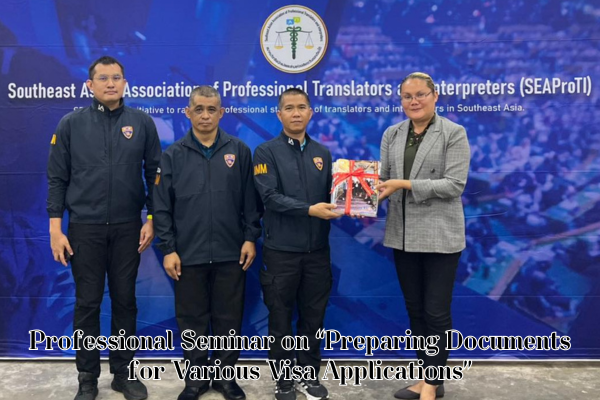Thailand and the Progress Toward Accession to the Apostille Convention:
Unlocking Legalization for International Use of Public Documents
25 April 2025, Bangkok – In today’s globalized world, people are increasingly crossing borders for education, work, or business. As a result, the use of Thai public documents abroad—or foreign public documents in Thailand—has become a common necessity. However, the current process of “legalization,” which involves certifying documents for international use, remains a major obstacle due to its complexity, time consumption, and cost.
One international legal instrument that can streamline this process is the Hague Convention Abolishing the Requirement of Legalization for Foreign Public Documents (Apostille Convention), which currently has over 125 member states worldwide.
As of April 2025, Thailand has not yet become a member of the Apostille Convention. However, efforts led by the Department of Consular Affairs, Ministry of Foreign Affairs, demonstrate a clear commitment to preparing the country for eventual accession.
Thailand’s Progress Toward Apostille Accession
Throughout 2023 and 2024, the Department of Consular Affairs organized a series of seminars to prepare both government agencies and private stakeholders for a transition to the Apostille system. These preparations included:
- Clarifying the difference between the traditional chain legalization and the Apostille system
- Amending domestic laws and procedures relating to document issuance
- Study visits to Apostille-implementing countries such as the Netherlands
- Exchanges with representatives from the Hague Conference on Private International Law (HCCH) and the U.S. Department of State
These initiatives reflect Thailand’s readiness to modernize its document authentication system, ensuring transparency, international alignment, and reduced administrative burdens on citizens and businesses.
The Apostille System and SEAProTI-certified Translators and Translation Certification Providers
Accession to the Apostille Convention is not just a bureaucratic reform; it carries significant positive implications for professional translators and translation verifiers, particularly those certified by the Southeast Asian Association of Professional Translators and Interpreters (SEAProTI). SEAProTI is the only professional body in Thailand officially recognized by the Royal Gazette Notification to certify Certified Translators and Translation Certification Providers under a professional framework.
Key Benefits for Translators and Verifiers:
- The Apostille system reduces duplication of signatures and status verifications currently required by multiple authorities.
- SEAProTI-certified translators and translation verifiers need access to Apostille services, as translations of official or legally binding documents for use abroad often require international certification to be legally valid in destination countries.
- The Apostille will enhance the credibility of Thai-English or foreign language translations issued by SEAProTI-certified professionals.
- It promotes the export of Thai language services and enables broader international recognition of Thai public documents in the fields of education, migration, and business.
National Benefits of Apostille Accession
- Shorter processing time and reduced costs for using Thai public documents abroad—e.g., birth certificates, marriage certificates, and corporate registrations.
- Facilitates international investment and skilled labor mobility.
- Modernizes Thailand’s public administration in line with global best practices and makes it more accessible to citizens.
- Strengthens trust in translations and certifications produced by qualified Thai professionals in Apostille member countries.
Conclusion
Thailand’s accession to the Apostille Convention represents more than just a legal reform—it reflects a shift in the Thai government’s approach to public service delivery in an interconnected world where the efficiency of document use has real economic and social consequences.
For certified translators and translation verifiers—especially those recognized by SEAProTI—this shift will raise the professional standing of their work, reinforce trust in the quality of their translations, and open new opportunities to serve individuals and businesses navigating cross-border legal and administrative processes in the digital era.
SEAProTI’s certified translators, translation certification providers, and certified interpreters:
The Southeast Asian Association of Professional Translators and Interpreters (SEAProTI) has officially announced the criteria and qualifications for individuals to register as “Certified Translators,” “Translation Certification Providers,” and “Certified Interpreters” under the association’s regulations. These guidelines are detailed in Sections 9 and 10 of the Royal Thai Government Gazette, issued by the Secretariat of the Cabinet under the Office of the Prime Minister of the Kingdom of Thailand, dated July 25, 2024, Volume 141, Part 66 Ng, Page 100.
To read the full publication, visit: the Royal Thai Government Gazette
ประเทศไทยกับความคืบหน้าในการเข้าร่วมอนุสัญญา Apostille: ปลดล็อกการนิติกรณ์เพื่อการใช้เอกสารระหว่างประเทศ
25 เมษายน 2568, กรุงเทพ – ในโลกยุคใหม่ที่พลเมืองมีการย้ายถิ่นข้ามพรมแดนมากขึ้น ไม่ว่าจะด้วยเหตุผลทางการศึกษา การทำงาน หรือธุรกิจ การใช้เอกสารราชการไทยในต่างประเทศ (หรือเอกสารต่างประเทศในไทย) จึงเป็นเรื่องที่เกิดขึ้นในชีวิตประจำวัน แต่ขั้นตอนของการ “นิติกรณ์” หรือการรับรองเอกสารระหว่างประเทศยังคงเป็นอุปสรรคสำคัญ ทั้งในแง่ของความซับซ้อน เวลา และค่าใช้จ่าย
หนึ่งในเครื่องมือทางกฎหมายระหว่างประเทศที่ช่วยลดขั้นตอนเหล่านี้ คือ อนุสัญญากรุงเฮกว่าด้วยการยกเลิกข้อกำหนดการนิติกรณ์สำหรับเอกสารมหาชนระหว่างประเทศ (Apostille Convention) ซึ่งมีประเทศภาคีแล้วกว่า 125 ประเทศทั่วโลก
แม้ว่า ณ เดือนเมษายน 2568 ประเทศไทยยังไม่ได้เข้าเป็นภาคีของอนุสัญญานี้อย่างเป็นทางการ แต่การขับเคลื่อนภายในโดยกรมการกงสุล กระทรวงการต่างประเทศ แสดงให้เห็นถึงเจตจำนงที่ชัดเจนในการเตรียมความพร้อมและวางระบบเพื่อรองรับการเข้าเป็นภาคีในอนาคต
ความคืบหน้าของประเทศไทยในการเตรียมเข้าร่วม Apostille
ตลอดปี 2566–2567 กรมการกงสุลได้จัดสัมมนาหลายครั้ง เพื่อเตรียมความพร้อมของหน่วยงานราชการและภาคเอกชนในการปรับตัวเข้าสู่ระบบ Apostille โดยเฉพาะในประเด็นสำคัญ เช่น
- ความแตกต่างระหว่างระบบ chain legalisation แบบเดิม กับการรับรอง Apostille
- การปรับปรุงกฎหมายภายในและกระบวนการออกเอกสาร
- การเยี่ยมชมและศึกษาระบบ Apostille ในประเทศเนเธอร์แลนด์
- การแลกเปลี่ยนกับผู้แทนจาก Hague Conference on Private International Law (HCCH) และกระทรวงการต่างประเทศสหรัฐฯ
การดำเนินงานดังกล่าวแสดงถึงความก้าวหน้าและความมุ่งมั่นของประเทศไทยในการยกระดับระบบการนิติกรณ์เอกสารให้มีมาตรฐานสากล โปร่งใส และลดภาระของประชาชนและภาคธุรกิจ
Apostille กับนักแปลรับรองและผู้รับรองการแปลของ SEAProTI
การเข้าร่วม Apostille Convention ไม่ได้เป็นเพียงการเปลี่ยนแปลงในเชิงระบบราชการเท่านั้น แต่ยังส่งผลกระทบเชิงบวกอย่างมีนัยสำคัญต่อ ผู้ประกอบวิชาชีพด้านการแปลและรับรองการแปล โดยเฉพาะผู้ที่ได้รับการขึ้นทะเบียนจาก สมาคมวิชาชีพนักแปลและล่ามแห่งเอเชียตะวันออกเฉียงใต้ (SEAProTI) ซึ่งเป็นสมาคมวิชาชีพที่มีข้อบังคับรับรองโดยราชกิจจานุเบกษา และเป็นหน่วยงานเดียวในประเทศไทยที่มีระบบ รับรองนักแปลรับรอง (Certified Translators) และ ผู้รับรองการแปล (Translation Verifiers) อย่างเป็นทางการประโยชน์ต่อผู้แปลและผู้รับรองการแปล:
- การเข้าสู่ระบบ Apostille จะ ลดความซ้ำซ้อนในการรับรองลายเซ็นและสถานะนักแปลรับรอง จากหลายหน่วยงาน
- ส่งเสริมการส่งออกบริการทางภาษาของไทย ไปสู่เวทีระหว่างประเทศ และรองรับการใช้เอกสารไทยในภาคธุรกิจ การศึกษา และการย้ายถิ่น
Apostille กับนักแปลรับรองและผู้รับรองการแปลของ SEAProTI
การเข้าร่วม Apostille Convention ไม่ได้เป็นเพียงการเปลี่ยนแปลงในเชิงระบบราชการเท่านั้น แต่ยังส่งผลกระทบเชิงบวกอย่างมีนัยสำคัญต่อ ผู้ประกอบวิชาชีพด้านการแปลและรับรองการแปล โดยเฉพาะผู้ที่ได้รับการขึ้นทะเบียนจาก สมาคมวิชาชีพนักแปลและล่ามแห่งเอเชียตะวันออกเฉียงใต้ (SEAProTI) ซึ่งเป็นสมาคมวิชาชีพที่มีข้อบังคับรับรองโดยราชกิจจานุเบกษา และเป็นหน่วยงานเดียวในประเทศไทยที่มีระบบ รับรองนักแปลรับรอง (Certified Translators) และ ผู้รับรองการแปล (Translation Verifiers) อย่างเป็นทางการ
ประโยชน์ต่อผู้แปลและผู้รับรองการแปล:
- การเข้าสู่ระบบ Apostille จะ ลดความซ้ำซ้อนในการรับรองลายเซ็นและสถานะนักแปลรับรอง จากหลายหน่วยงาน
- นักแปลและผู้รับรองการแปลของ SEAProTI มีความจำเป็นที่จะต้องใช้บริการ Apostille นี้ด้วย เนื่องจากการแปลเอกสารราชการหรือเอกสารที่มีผลผูกพันทางกฎหมายในต่างประเทศ มักต้องผ่านกระบวนการรับรองระดับนานาชาติ เพื่อให้เอกสารมีผลทางกฎหมายในประเทศปลายทาง
- ช่วยเพิ่ม ความน่าเชื่อถือของเอกสารแปลไทย-อังกฤษ/ต่างประเทศ ที่ออกโดยผู้ได้รับการรับรองจาก SEAProTI
- ส่งเสริมการส่งออกบริการทางภาษาของไทย ไปสู่เวทีระหว่างประเทศ และรองรับการใช้เอกสารไทยในภาคธุรกิจ การศึกษา และการย้ายถิ่น
ประเทศไทยจะได้ประโยชน์อย่างไรจากการเข้าเป็นภาคี Apostille
- ลดระยะเวลาและค่าใช้จ่าย ในการใช้เอกสารราชการไทยในต่างประเทศ เช่น สูติบัตร ใบสมรส หนังสือรับรองนิติบุคคล ฯลฯ
- ส่งเสริมการลงทุนและการเคลื่อนย้ายแรงงานฝีมือ ระหว่างประเทศ
- ปรับปรุงภาพลักษณ์ระบบราชการไทย ให้ทันสมัย เป็นมิตรต่อประชาชน และเท่าทันมาตรฐานสากล
- สนับสนุนการแปลและรับรองเอกสารจากนักแปลวิชาชีพของไทย ให้เป็นที่ยอมรับในประเทศภาคีต่าง ๆ
บทสรุป
การเข้าร่วมอนุสัญญา Apostille ไม่ใช่เพียงการเปลี่ยนระบบเอกสาร แต่คือการเปลี่ยนวิธีคิดของรัฐไทยต่อการให้บริการประชาชน และส่งเสริมภาคธุรกิจในยุคที่ความคล่องตัวของเอกสารมีผลต่อการดำเนินชีวิตและเศรษฐกิจอย่างมีนัยสำคัญ
สำหรับนักแปลและผู้รับรองการแปลโดยเฉพาะผู้ได้รับการรับรองจาก SEAProTI การเปลี่ยนแปลงนี้จะยกระดับสถานะทางวิชาชีพ เพิ่มความมั่นใจในคุณภาพการแปล และสร้างโอกาสใหม่ในการให้บริการแก่ภาคประชาชนและภาคธุรกิจข้ามพรมแดนในยุคดิจิทัลอย่างแท้จริง
เกี่ยวกับนักแปลรับรอง ผู้รับรองการแปล และล่ามรับรองของสมาคมวิชาชีพนักแปลและล่ามแห่งเอเชียตะวันออกเฉียงใต้
สมาคมวิชาชีพนักแปลและล่ามแห่งเอเชียตะวันออกเฉียงใต้ (SEAProTI) ได้ประกาศหลักเกณฑ์และคุณสมบัติผู้ที่ขึ้นทะเบียนเป็น “นักแปลรับรอง (Certified Translators) และผู้รับรองการแปล (Translation Certification Providers) และล่ามรับรอง (Certified Interpreters)” ของสมาคม หมวดที่ 9 และหมวดที่ 10 ในราชกิจจานุเบกษา ของสำนักเลขาธิการคณะรัฐมนตรี ในสำนักนายกรัฐมนตรี แห่งราชอาณาจักรไทย ลงวันที่ 25 ก.ค. 2567 เล่มที่ 141 ตอนที่ 66 ง หน้า 100 อ่านฉบับเต็มได้ที่: นักแปลรับรอง ผู้รับรองการแปล และล่ามรับรอง


